Jul 9, 2025. Weekly Dharma Assembly, Asia Lecture Tour (1) Singapore
Hello. Today marks the first stop of the Asia lecture tour, with Sunim’s Dharma Q&A being held in Singapore.
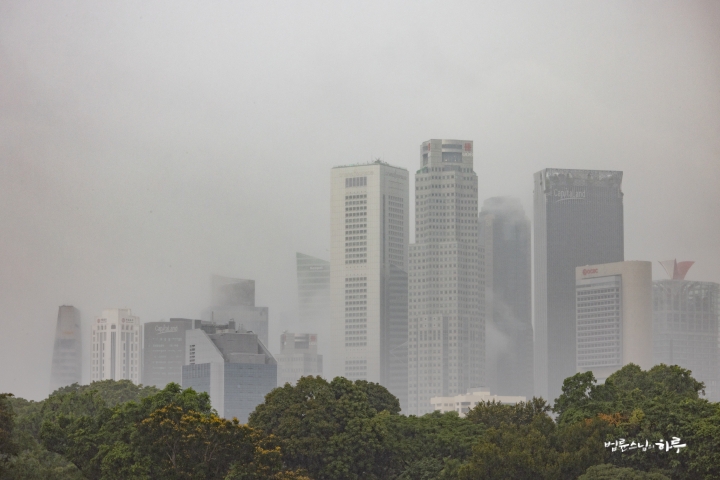
After completing morning practice and meditation, Sunim had a simple breakfast at 7 AM. Since there was a park right in front of the accommodation, he went for a brief walk after the meal.
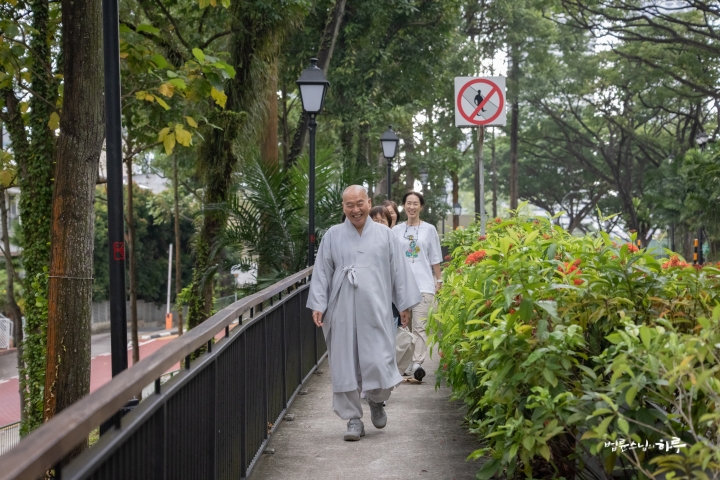
As Sunim reached the park entrance, dark clouds gathered and lightning began to split the sky. After briefly looking around the park, he hurried back to the accommodation. Raindrops started falling, and as soon as he entered the accommodation, heavy rain began pouring down.
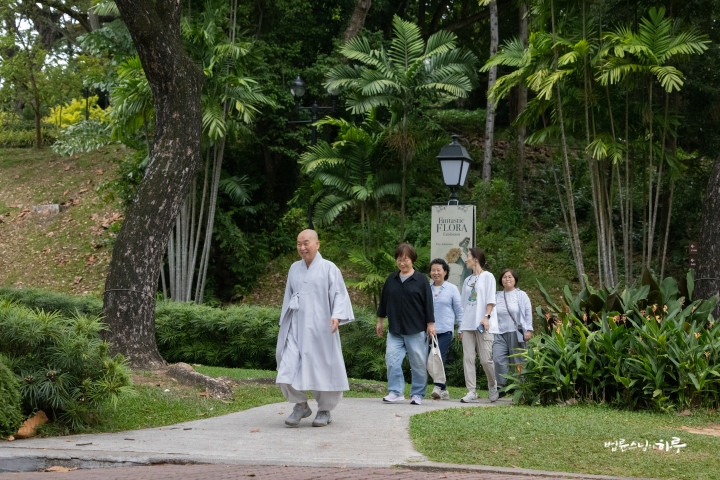
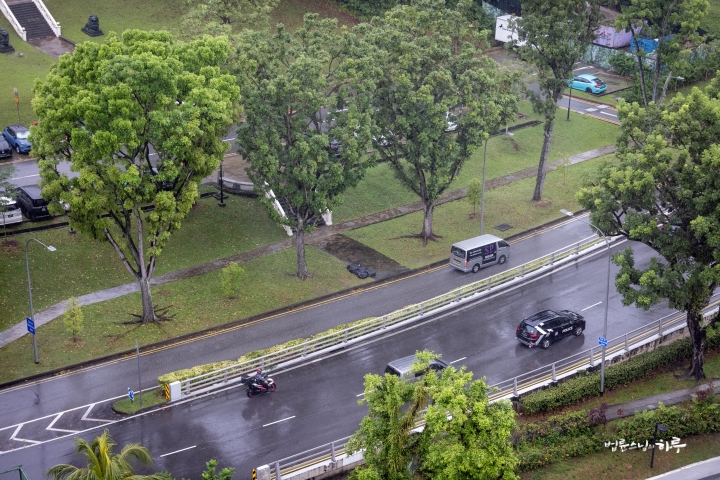
From 9 AM, Sunim conducted a live broadcast of the Weekly Dharma Assembly from the accommodation. It was 10 AM Korean time. After all Jungto Society members entered the video conference room, they recited the Three Refuges and the Heart Sutra, then watched a video together about the news of Jungto practitioners from the past week.
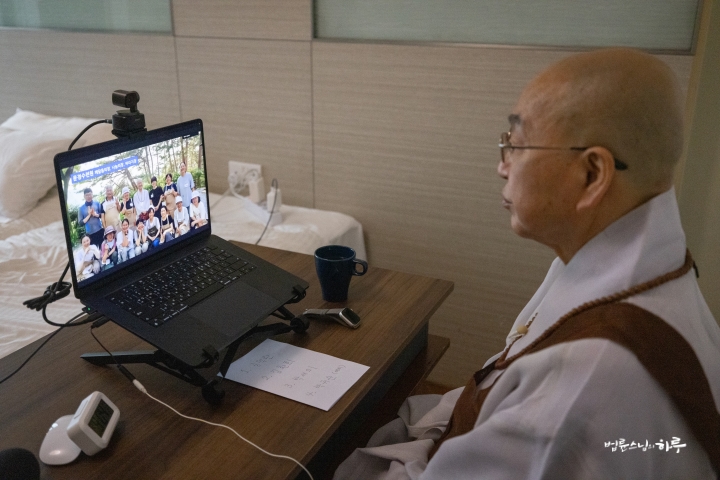
After the video ended, Jungto Society members requested a dharma talk from Sunim with three prostrations. Sunim expressed his gratitude to the members who had volunteered in various places over the past week.
“The weather has been quite hot lately, hasn’t it? Last week, I also traveled to various places to host the Southeast Asian monks who came for the INEB Study Tour, and it was really hot. The heat wave continues this week as well. In my childhood memories, it wasn’t until early August that the sun-drenched yards and streets became too hot to venture out. But now, even though it’s only early July, it feels as hot as early August back then. Not only in Korea but worldwide, abnormal high temperatures continue. Even in Europe, where summers are relatively cool, heat waves reaching 40 degrees Celsius persist. It seems we’re experiencing climate change firsthand.
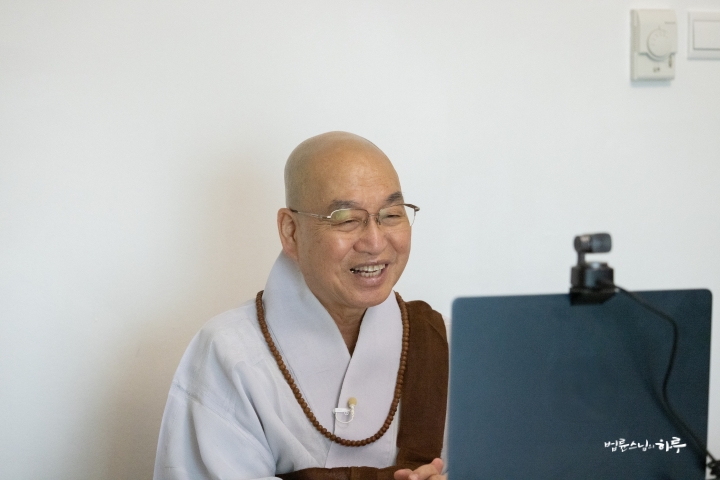
Despite this sweltering heat, the activities of our volunteers haven’t stopped. I think the biggest event last week was the semi-annual retreat for leading members. I sincerely thank the leading members who participated in the retreat and the Dharma Teachers who conducted it. I would also like to take this opportunity to thank the members from each division who devotedly prepared meals for our INEB guests from abroad at the Seoul Jungto Social and Cultural Center, Mungyeong Jungto Retreat Center, and Dubuk Jungto Retreat Center.
I am currently in Singapore. This week, I will continue the Dharma Q&A lectures touring Singapore, Ho Chi Minh City, Hong Kong, and Taiwan. After completing the tour, I will see you all again in Korea next week.”
Following this, those who had submitted questions in advance had conversations with Sunim. One person expressed disappointment in not being able to fully focus on painting and asked Sunim for advice on how to concentrate completely on their artwork.
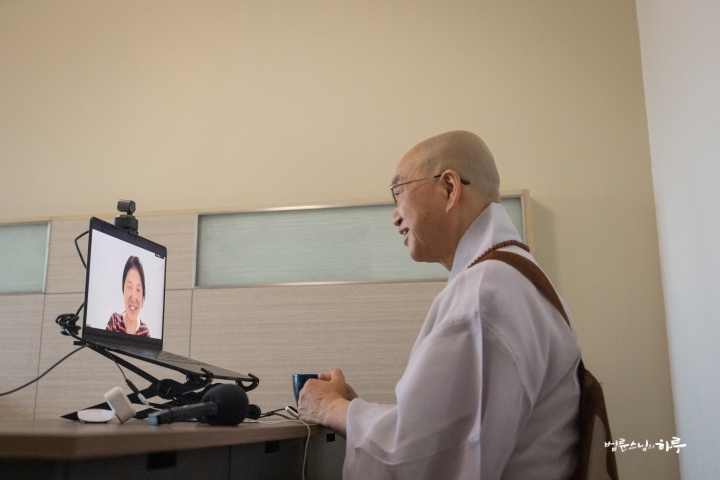
I Can’t Focus on What I Really Want to Do Well
“Since you’re young, is it okay if I speak frankly? You won’t be hurt or resentful, will you?”
“Yes, it’s fine.”
“Actually, you don’t want to paint; you want to become famous. If you really wanted to paint, you would forget to eat, forget to sleep, forget you need to go to work, and just paint. That’s the kind of person who truly wants to paint.
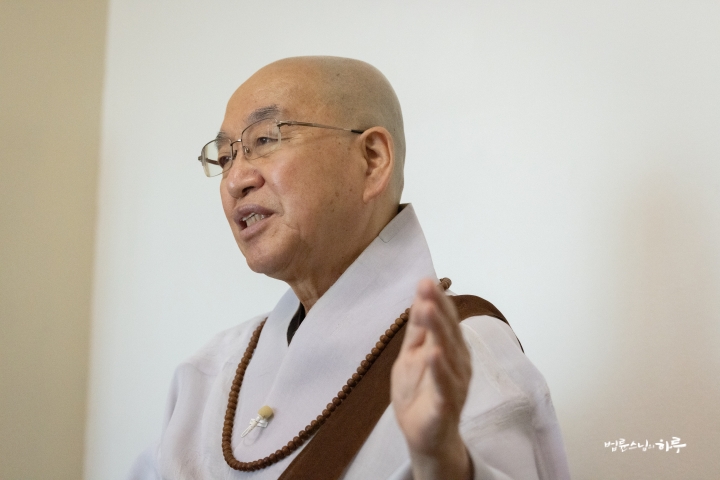
But while you have a strong desire to become famous through painting, your desire to actually paint isn’t as strong. Since you need to force yourself to paint to become famous, it’s painful. It’s like someone who doesn’t want to study but wants to be number one. You want to go to Seoul National University but don’t want to study. So even when you sit at your desk, you can’t study and keep having distracting thoughts.
How about not painting for a while? Just live doing your part-time job. You said you can concentrate well when doing part-time work. That’s because you need money right away. It’s not because the work is fun, but because you can earn money that you can focus. But with painting, you can only make money if you become famous, and since it’s uncertain whether you’ll become famous or not, it’s hard to concentrate. So take a break from painting for now. If you feel fine without painting and actually feel more at ease, it’s better to quit. Even if you majored in painting, it’s better to quit.
When I give dharma talks, I don’t feel like I don’t want to do it. Even when doing other things, entering the lecture hall when it’s time for a dharma talk isn’t difficult. But when I’m absorbed in farming, when dharma talk time approaches, I hesitate for a moment thinking, ‘Do I have to go?’ When I’m cutting grass in the field and someone tells me, ‘Sunim, it’s almost time for the dharma talk!’ I feel a bit bothered thinking I have to wash up and change clothes. Looking at this, even though I’ve lived my whole life giving dharma talks, it seems I don’t really do it because I truly love it. What I really seem to enjoy is farming. Farming is enjoyable even when I’m sweating profusely. Even when people around me worry and try to stop me because I’m not feeling well, I just get up and go farming. It’s partly habit, but it also means I enjoy it that much. I originally planned to retire from monastic life at 70, but couldn’t due to circumstances. But around 80, I’d like to take off my robes, retire, and just farm until I die. When dying, it’s best to die doing what you want to do. Of course, I don’t know if it will happen that way, but that’s my wish.
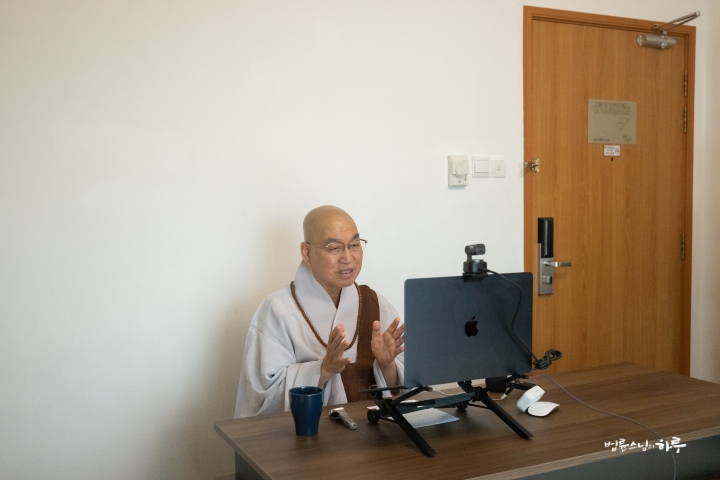
Like that, you don’t really want to paint either. You have some talent for painting, but your desire to become famous is stronger. Since you have to force yourself to paint to become famous, distracting thoughts keep arising. I don’t have many distracting thoughts when reading books. I don’t have to read, but since I read to solve my curiosities, I never force myself to read. When I’m truly curious thinking ‘What is this?’ and open a book, I only stop when my eyes hurt or it gets too late.
If you don’t want to paint, you don’t have to. But since you majored in painting and even studied abroad, you have this goal in your mind that ‘I must succeed with painting somehow.’ So your heart doesn’t really want it, but you have to force yourself to paint. That’s why distracting thoughts keep arising. If you really don’t want to paint, how about taking a break for a while? Only paint lightly when you feel like it. If you have no regrets after taking a year off, it’s better to let go of the idea of making a living through painting. Instead, paint only as a hobby and find a new job to make a living. If you take this perspective, you’ll be able to sort out how to live your life. This might have been somewhat painful to hear, but that’s what I think. What do you think?”
“Yes, I think I need to look at myself more honestly. However, I have an exhibition in September, so it’s difficult to quit right now.”
“Then just push through until September. After that, don’t force yourself to worry anymore. If you don’t want to do it, don’t.”
“Yes, I’ll prepare hard for the exhibition until September, and then quit without regrets.”
“Think of it as your last and really do your best this time. Even if you don’t want to, paint hard thinking ‘This is the last time!'”
“Yes, I understand. I thought Sunim would scold me a lot, but thank you for speaking so warmly.”
“Did I scold you less than expected? Then I’ll scold you more.” (laughter)
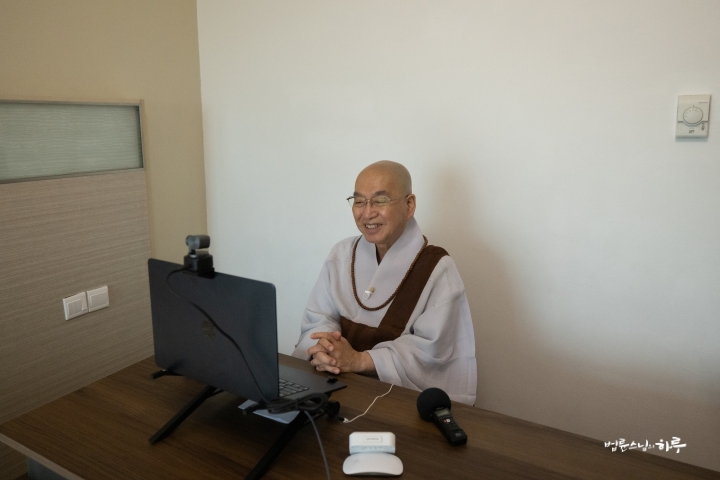
“Thank you for your honest opinion, Sunim. I’ll look at myself more honestly and do my best for this exhibition. Thank you.”
Questions continued to follow. After conversing with four people, it was 11 o’clock and the live broadcast of the Weekly Dharma Assembly concluded.
After finishing the Weekly Dharma Assembly, Sunim had lunch with members of Singapore Jungto Society at a nearby restaurant.
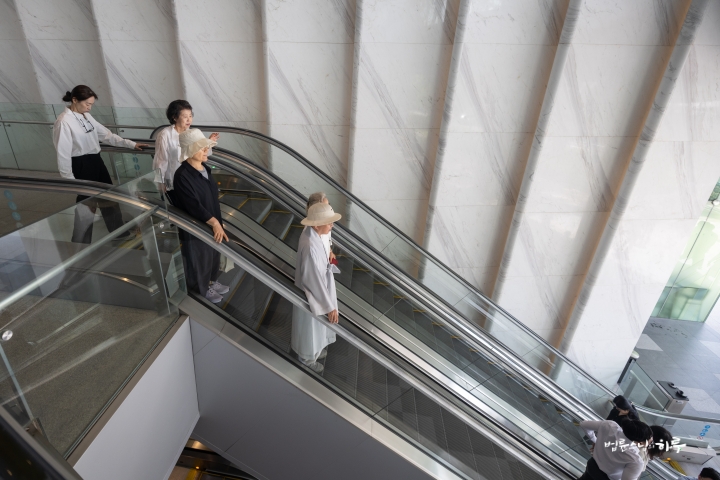
The members had taken leave or half-days from work to prepare for today’s lecture. Grateful for their dedication, Sunim greeted them with a smile.
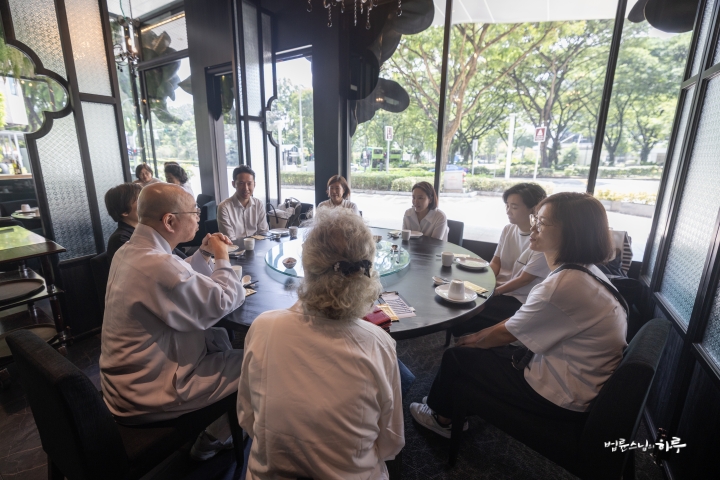
“What’s there to prepare that you even took leave to get ready for the lecture?” (laughter)
The members understood the encouragement in Sunim’s words and laughed together. One person asked about Sunim’s well-being.
“How is your health, Sunim? You look better than when you came last year.”
“I’m not in good condition. I can’t even remember when I was last healthy.” (laughter)
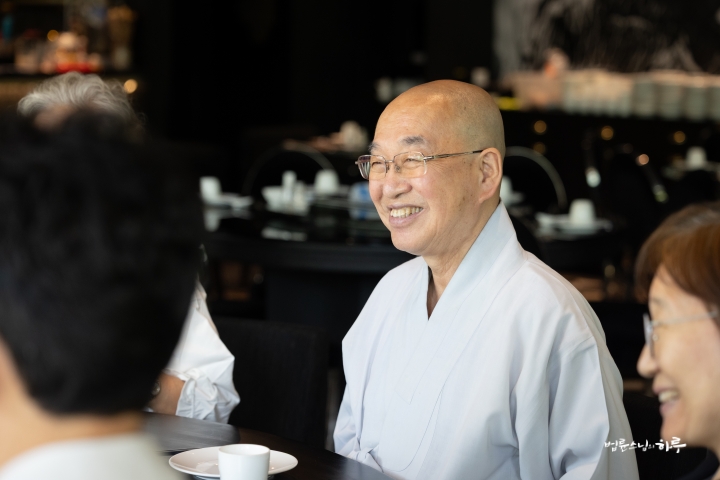
During the meal, they shared updates about the local situation in Singapore and the members’ recent activities. One member expressed gratitude.
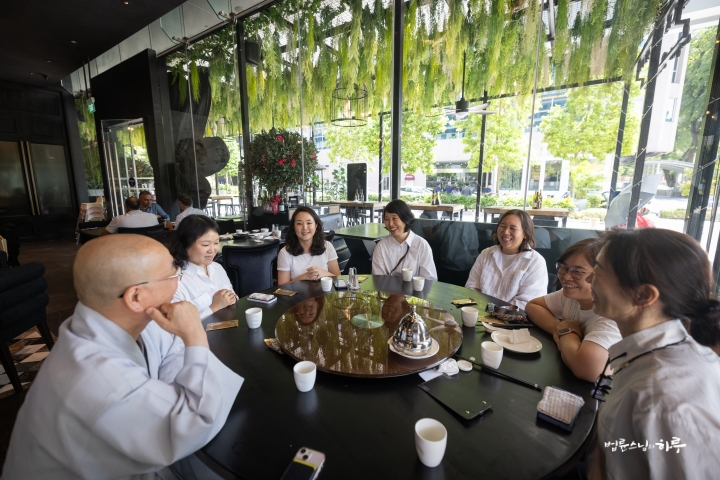
“I came to Singapore and was running a travel business, but it became very difficult as the COVID pandemic dragged on. Graduating from Jungto Dharma School and the Sutra Course was a great help during that time. Without Jungto Society, it would have been really hard to endure. Thank you.”
After ample conversation, they returned to the YWCA Fort Canning Centre, which served as both accommodation and lecture venue, after 2 PM.
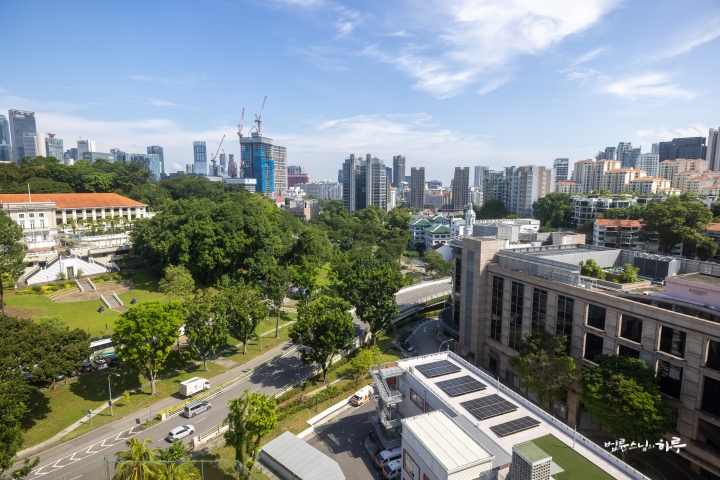
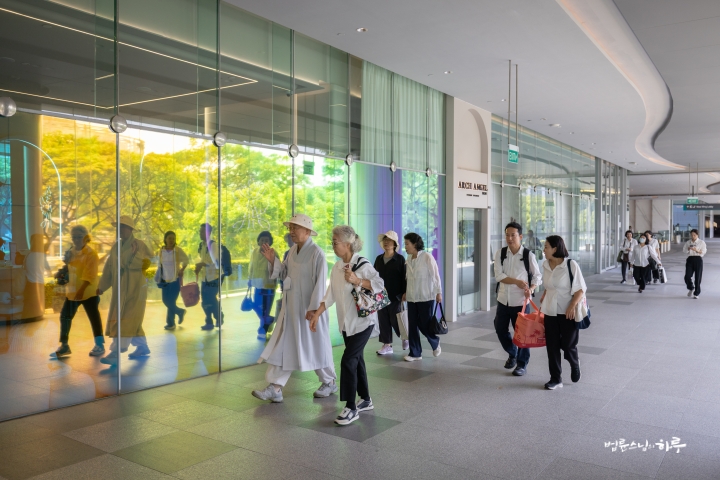
Before going up to the accommodation, Sunim toured the venue for tonight’s lecture.
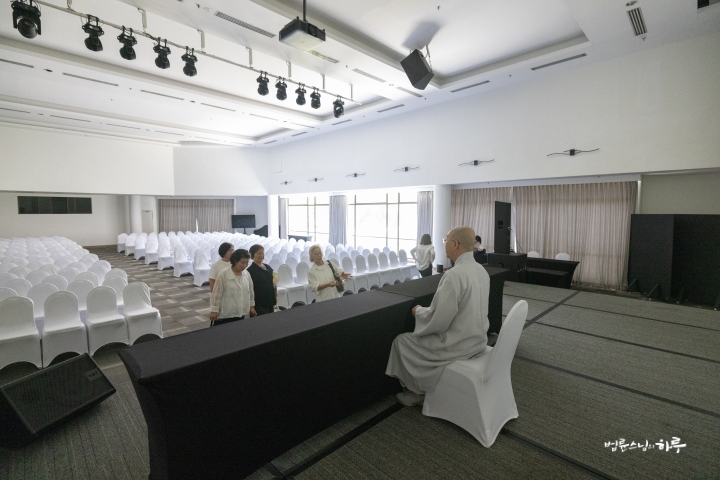
Volunteers dispersed throughout the venue to begin preparations for the lecture.
“Well then, please take care of the preparations. I’ll go upstairs.”
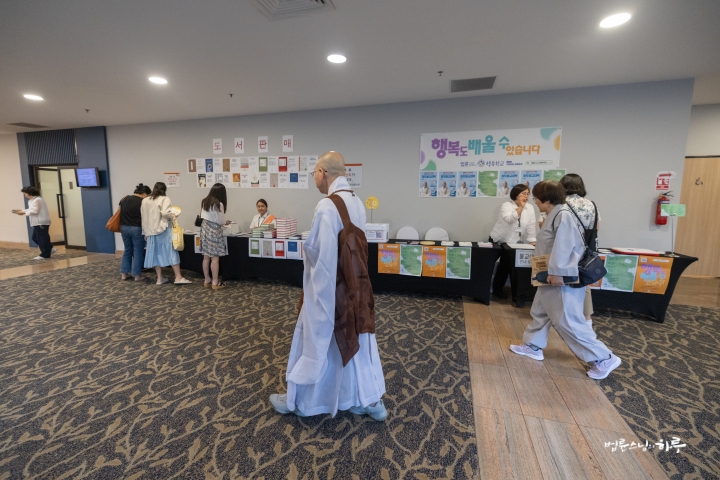
After attending to some work and taking a brief rest in the accommodation, Sunim headed to the YWCA auditorium where today’s lecture would be held at 6 PM. Volunteers were warmly welcoming the Korean expatriates who had come to the lecture hall.
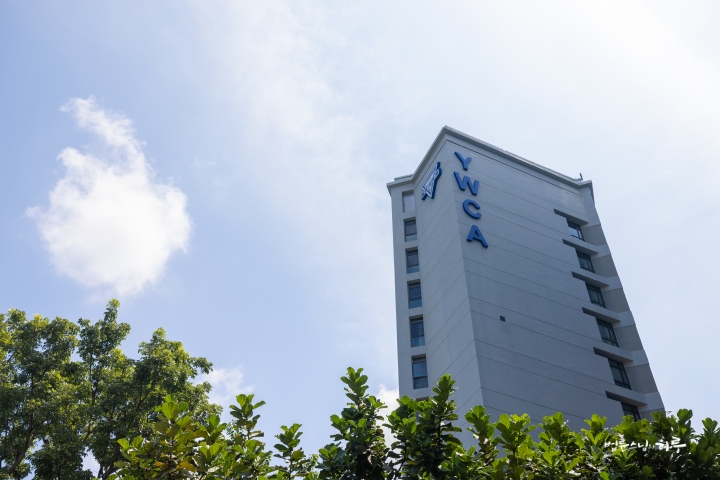
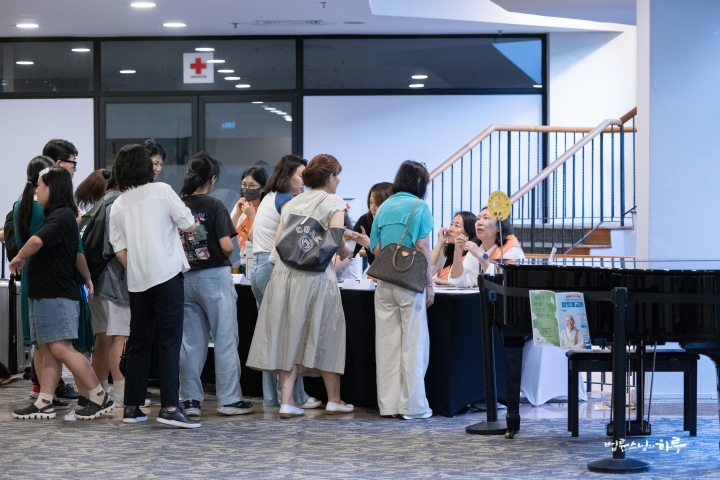
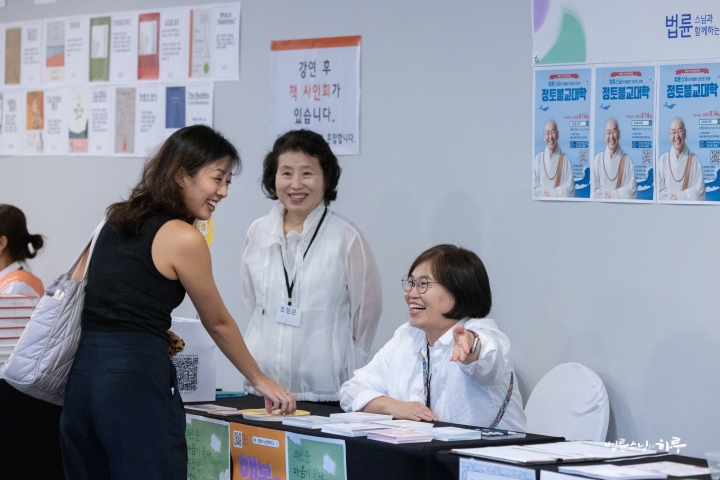
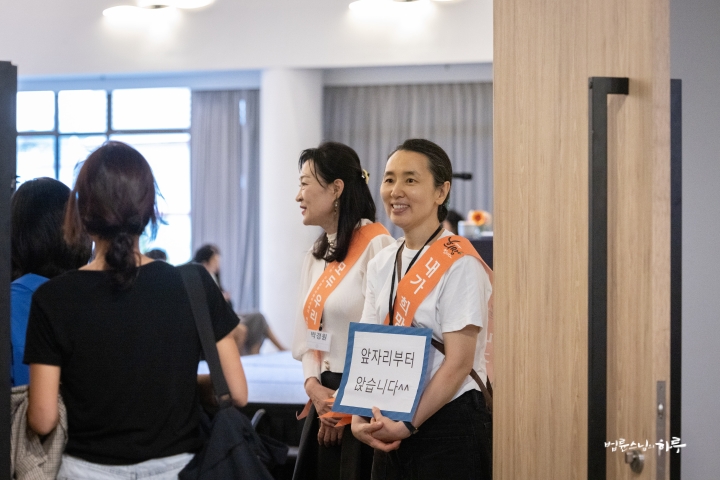
From 6:20 PM, Sunim had tea with local dignitaries from Singapore in the waiting room in front of the lecture hall. Many people were present to greet Sunim, including the president and vice president of the Singapore Korean Association, the women’s association president, and the minister-counselor from the embassy.
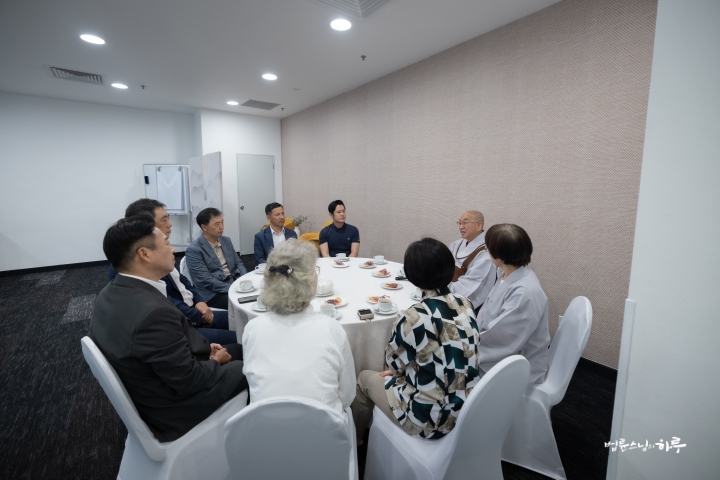
“Sunim, you travel abroad so much. How many overseas lectures is this for you?”
“This is my first overseas lecture this year. In the first half of the year, I stayed in Seoul without moving for a hundred days to give the 100-Day Dharma Talk. Singapore is my first overseas lecture after the 100-Day Dharma Talk ended.”
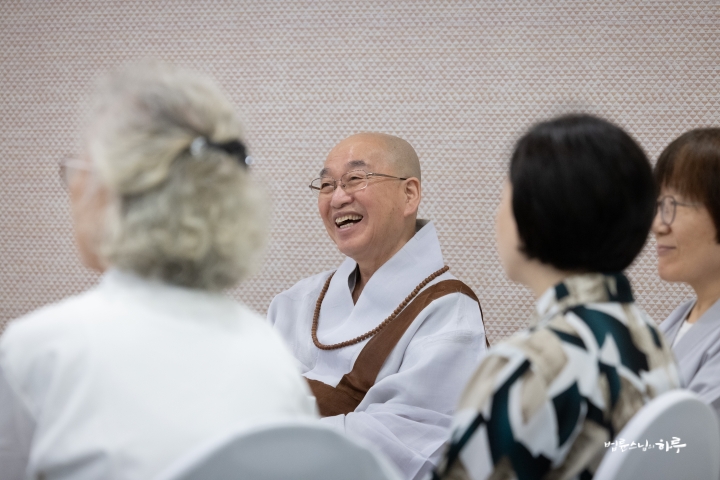
The president of the Korean Association mentioned that this year has special significance.
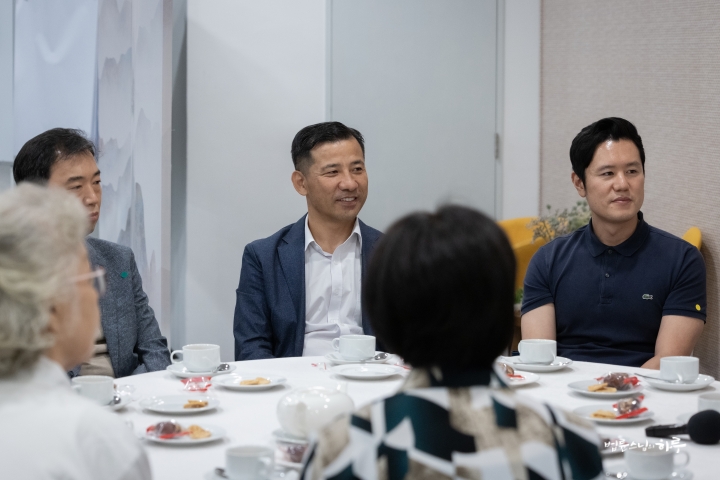
“This year marks the 50th anniversary of diplomatic relations between Korea and Singapore. There are 25,000 Korean expatriates living here. So we’re preparing various events.”
The local dignitaries asked Sunim various questions. Everyone was curious about how Sunim, who frequently travels abroad, feels.
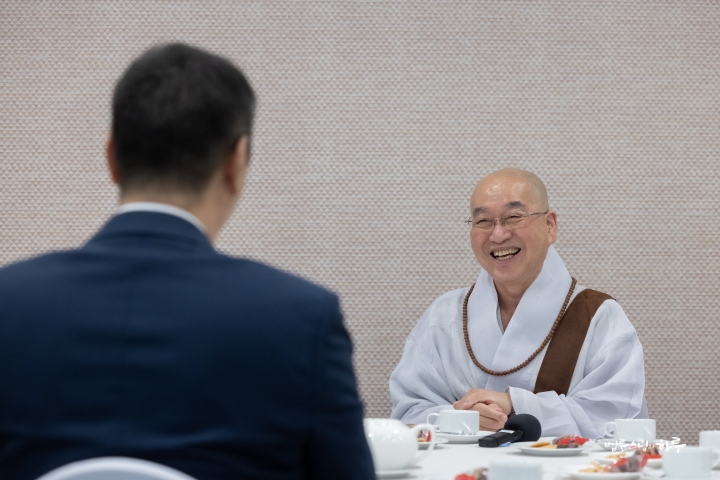
“Sunim, you give lectures in many countries. Are there characteristics unique to each expatriate community?”
“Generally, people think that since Southeast Asia has many poor countries and Europe has many wealthy countries, the expatriate communities in Southeast Asia would be poor while those in Europe would be wealthy. However, the reality is quite the opposite. In Southeast Asia, most people went as investment immigrants, so the expatriate community often belongs to the upper class in those countries. However, in Europe, most went as labor immigrants, so they often belong to the lower class in those countries. Of course, in America, it’s about half investment immigrants and half labor immigrants.”
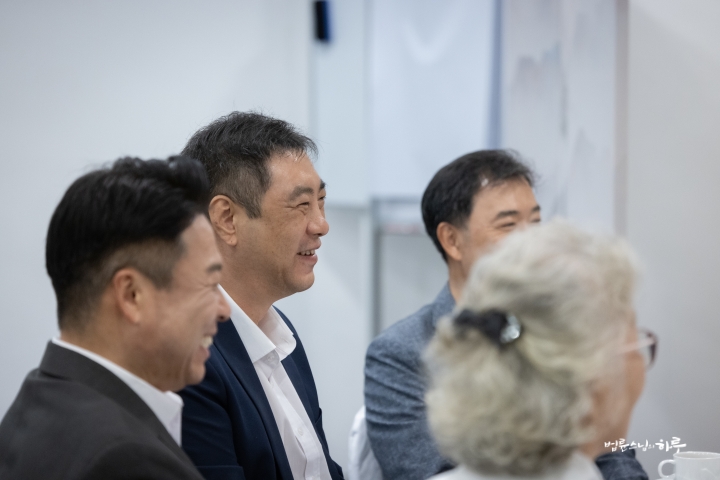
“Especially since you listen to many people’s concerns, Sunim. While people’s worries might be similar everywhere, are there any differences?”
“The concerns of expatriates living in Southeast Asia aren’t very different from those of people living in Korea. However, expatriates living in Europe often worry about their identity. Despite living in Europe for a long time, they’re not Europeans, yet returning to Korea isn’t comfortable either. I receive many questions about this identity confusion. Also, expatriates abroad often feel psychological burden when their elderly parents are about to pass away and they can’t take care of them. However, expatriates in Southeast Asia frequently travel back and forth to Korea as if visiting their own home, so such concerns are relatively weaker.”
As they conversed, it was time to start the lecture. After finishing tea and taking commemorative photos, everyone moved to the lecture hall together.
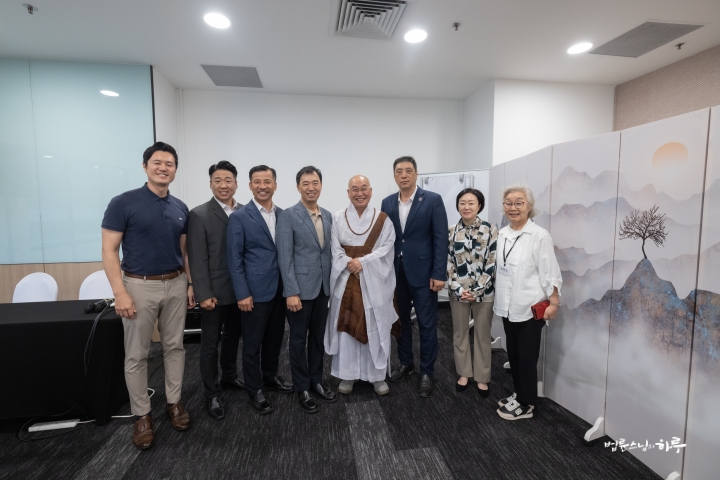
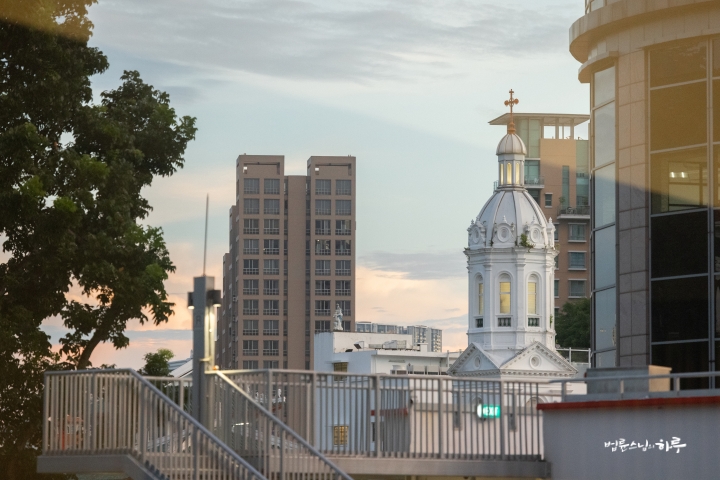
About 300 expatriates filled the venue. After the introductory video about Sunim ended, he took the stage amid enthusiastic applause from the audience.
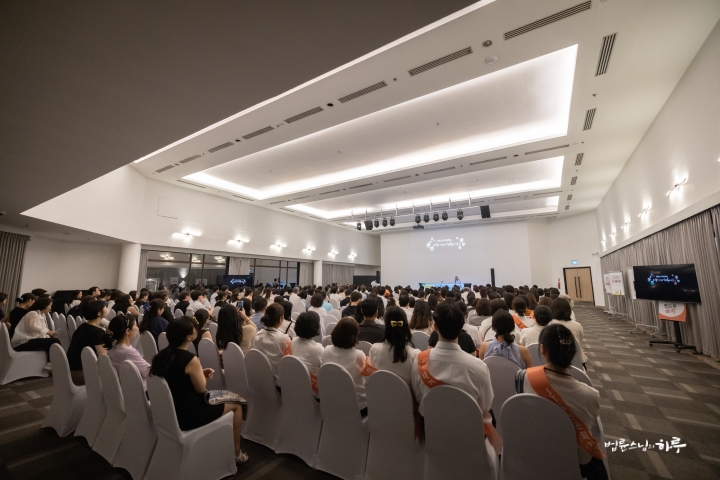
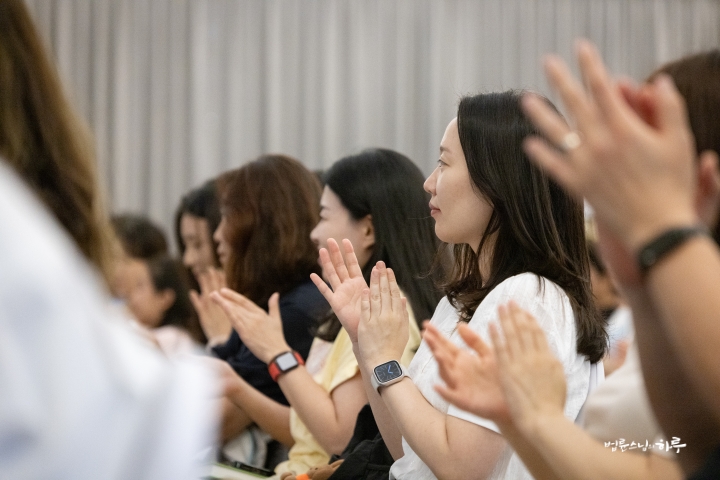
“It’s nice to meet you all. I should normally give lectures standing, but as I’ve gotten older and used my legs a lot, my knees hurt and it’s difficult to stand for long periods. Though it may be impolite, I ask for your understanding as I must sit while giving this lecture. Just two years ago when I came here, I gave the lecture standing. But one day after hiking, my legs felt sore and I thought ‘It’ll get better on its own,’ but when I later had a detailed examination at the hospital, they said my meniscus was torn. So I was told not to stand or walk for too long. Standing for lectures and walking are mainly what I’ve been doing, so this has become somewhat inconvenient. Still, I think ‘This is good enough’ after using them well for over 70 years. If lectures get longer in the future, I’ll have no choice but to sit like this. Is that okay?”
“Yes.”
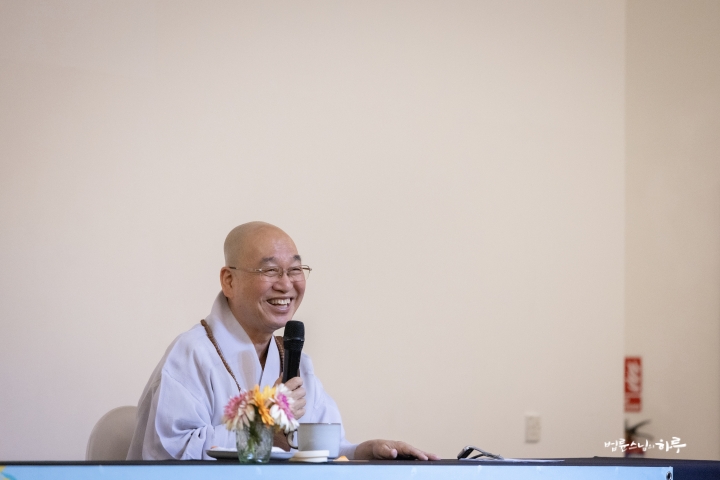
“Yesterday someone heard I was going to Singapore and said, ‘Sunim, it’s incredibly hot there.’ But now that I’m here, it’s not that hot. (laughter)
These days, Korea is actually hotter. There are many days when the daytime temperature rises to 35 degrees Celsius. Seoul’s air quality is poor so the sun feels less intense, but when you go to the provinces, the sun is really scorching. It seems true that the average temperature has risen compared to before.
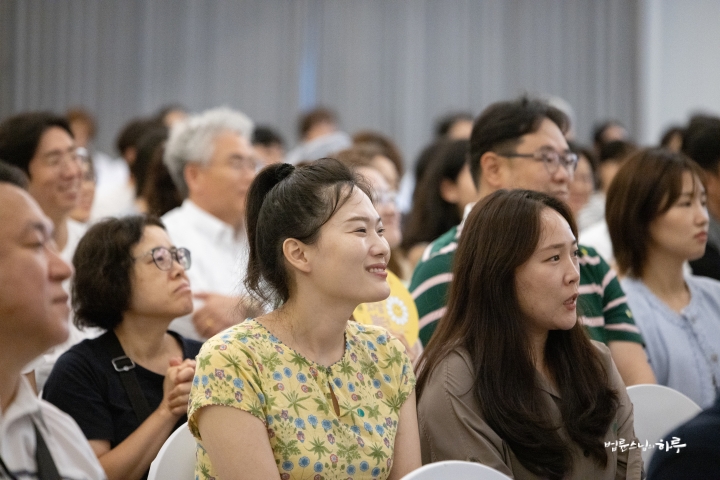
The Climate Crisis Is No Longer Someone Else’s Problem
Recently, I visited the wildfire-affected areas in Gyeongsangbuk-do. According to the affected residents, the wind was as strong as a typhoon, and the speed at which the fire spread was impossible for people to keep up with. The fire crossed one mountain, then another, hopping all the way to the East Sea. It was fortunate there was the East Sea; without it, the flames might have continued indefinitely. The wildfire even burned moored boats and caused massive damage to the coastline before finally ending. These were the kind of massive wildfires we used to see only in Australia, Siberia, LA, or Canada, things we always thought of as other countries’ problems, but now they can happen in our country too. The area burned in this single wildfire equals the combined area of all wildfires over the past 30 years. The scale of damage was so extensive that many people lost their homes and livelihoods. The flames spread so quickly that monks living in valley hermitages and elderly people in rural areas had no time to escape.
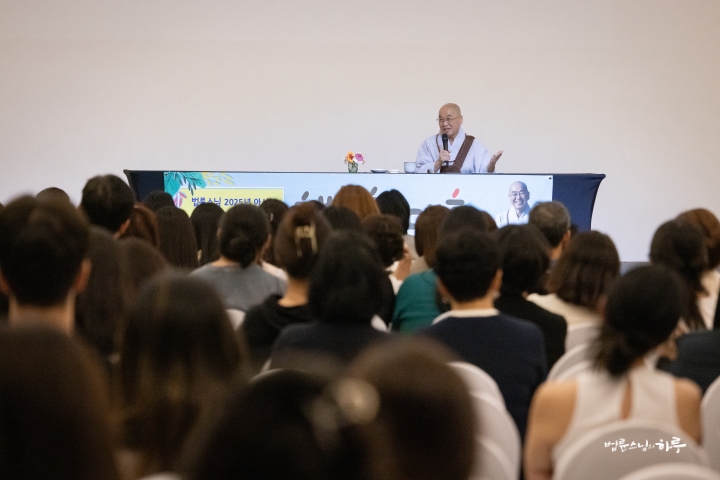
This climate crisis cannot be addressed by the efforts of any single country alone. It’s difficult even if all of humanity joins forces. Especially after President Trump took office in the United States and international cooperation like the Paris Climate Agreement broke down, with everyone going their own way, the outlook for the future has become even darker. But Singapore is originally a hot country, so it shouldn’t be a big problem, right? It might even get better. Let me start our conversation with this topic.”
Next, those who had pre-registered questions raised their hands and engaged in conversation with Sunim. Over the course of two hours, nine people asked Sunim questions. One of them shared that he had come to Singapore unwillingly due to company reorganization and sought Sunim’s advice on how to deal with feeling pushed aside from headquarters.
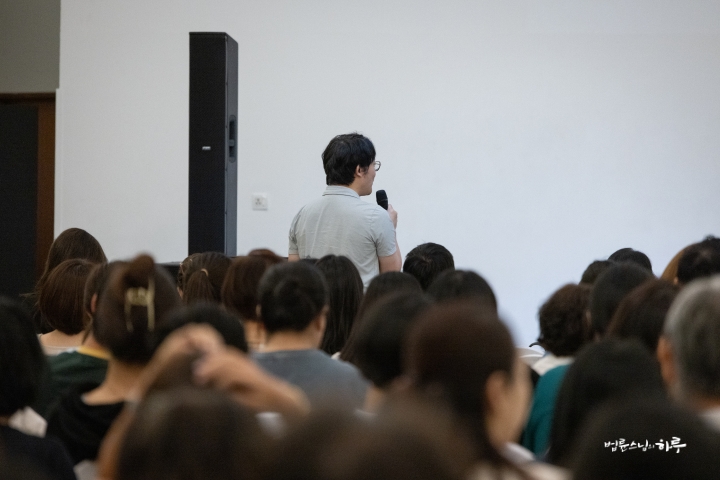
Sudden Overseas Assignment: Worried About the Future Amid Disappointment and Anxiety
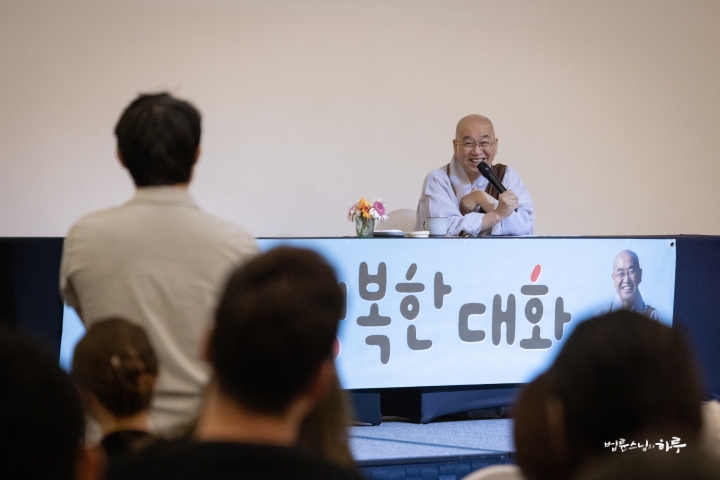
“Being dispatched overseas has both good and bad aspects in equal measure. It’s the same whether in government organizations or companies. To get promoted well, you need to be at the center, where the top decision-makers are. Once you’re pushed to the periphery, it’s not easy to get back in line. From that perspective, when you return after working in Singapore for a few years, it might be a bit difficult to secure a position at the center. Your position has already become what it is. To put it simply, you’ve already been pushed to the periphery. You need to accept this fact first. How can everyone play the role of the face? Someone has to play the role of hands and feet too. It’s true that you’ve moved away from the center. But if it’s better to continue working at this company even in this role, you should accept it willingly. First, it’s necessary to make such a clear diagnosis of the situation.
However, when talented people work in central departments, they often can’t demonstrate their abilities because they’re limited to their job responsibilities. Even when they show talent, the results are usually absorbed as credit for their superiors. So it’s a structure where individuals find it difficult to shine. But when you go to the periphery, although you’ve been pushed aside, there are opportunities. This is true historically as well. While it’s comfortable to live near the king in the short term, during times of national or social turmoil, people in the periphery have cultivated their own foundations, raised armies, and established new countries.
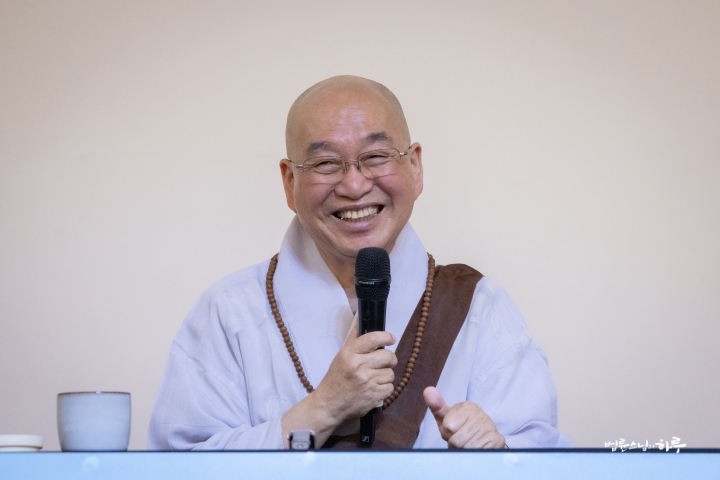
If you have talent, now is the opportunity to showcase it freely. In the periphery, you have to handle various tasks comprehensively all at once. When you’re young, joining a small or medium-sized company, although the salary is lower compared to large companies, greatly helps in gaining diverse experience. You can do sales, accounting, cleaning – you can have all kinds of experiences by yourself. On the other hand, even after working at a large company for 10 years, many people don’t know much beyond their assigned tasks. So there are pros and cons to each.
So you don’t need to conclude that being pushed aside is necessarily disadvantageous. For example, what happens to someone who was disliked and pushed aside by the previous government when the regime changes? They actually become advantaged. Conversely, those who were at the core of power often have to step down when the regime changes. Right now in Korea, those who tried to look good to the Yoon Suk-yeol government and participated in the core of the December 3 martial law declaration all have to take responsibility now, don’t they? As the saying goes, ‘Life is unpredictable like the old man’s horse at the frontier(塞翁之馬),’ we can’t immediately know what’s advantageous or disadvantageous.
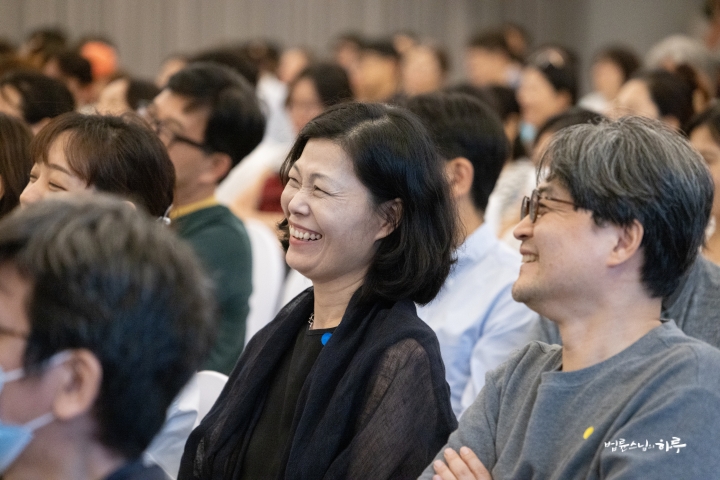
People always think only of the advantageous side and say ‘the periphery is good’ or ‘the center is good.’ Then when things don’t go as planned, they easily think ‘it’s disadvantageous because it’s the periphery’ or ‘it’s disadvantageous because it’s the center.’ While it’s true you’ve been pushed aside, that doesn’t necessarily bring only bad results. I was once ostracized in the Buddhist community, but as a result, I ended up playing a central role in interfaith dialogue. If I had only been friendly with monks, the world wouldn’t have valued me highly. Being ostracized, I instead became friends with priests, pastors, and bishops, and thanks to that, I was able to expand my activities beyond domestic interfaith dialogue to international peace activities. When inter-Korean relations are poor, exchange and cooperation activities may be criticized domestically, but they are highly valued by the international community. Thanks to that, I was able to receive the Ramon Magsaysay Award for Peace and International Understanding. Like this, what seems disadvantageous now may be advantageous later, and what’s advantageous now may someday be disadvantageous. So it’s better not to judge advantages and disadvantages too hastily. You’ve been pushed aside, that’s correct, but it’s not necessarily disadvantageous – it could be a new opportunity. This is the perspective you should have.
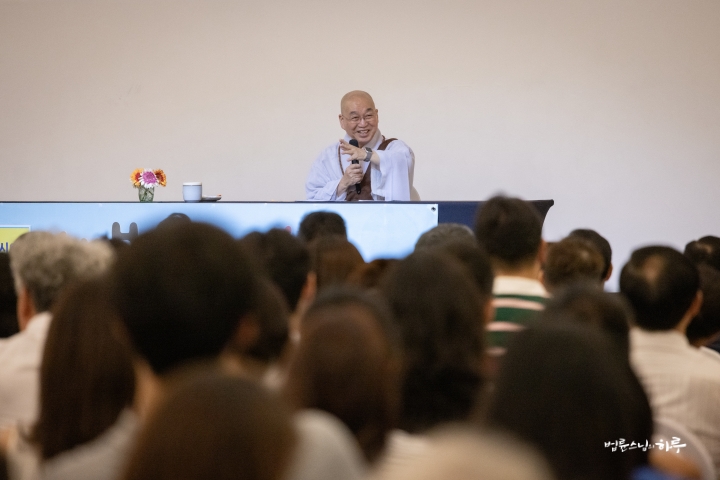
There’s no point in being dissatisfied with organizational personnel matters. The personnel authority isn’t mine, is it? Thinking about things I can’t decide only gives me a headache and doesn’t help. In fact, dissatisfaction arises because it wasn’t what I wanted. If I had wanted to go overseas but wasn’t sent, I would have been dissatisfied then too. So just think of it as ‘I wanted to stay in Korea but was dispatched overseas, so I feel a bit bad because it’s different from what I wanted.’ If you express dissatisfaction saying the personnel decision itself was wrong when you’ve already been pushed to the periphery, promotions will become even more disadvantageous. Rather, you should think of it as a blessing in disguise. Although you didn’t want it, now that you’re actually in Singapore, you can discover many things that are better than expected. It’s also nice to lead local staff and become the top person in charge of one location. There’s a saying that it’s better to be the head of a snake than the tail of a dragon. Please try living with this perspective.”
“Thank you. I understand well.”
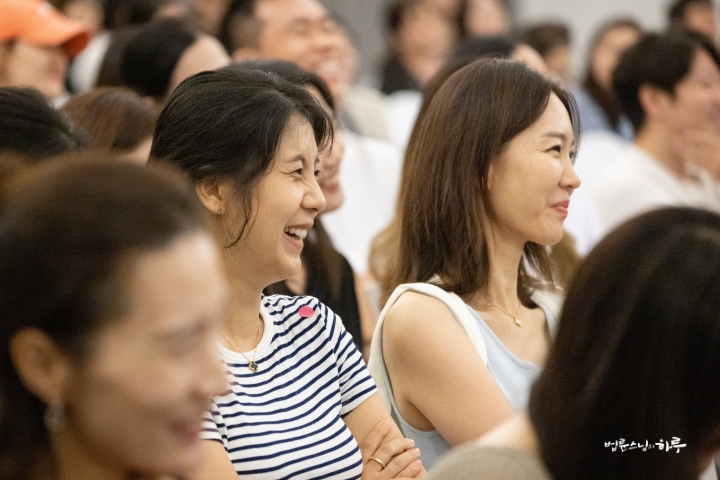
Questions continued one after another.
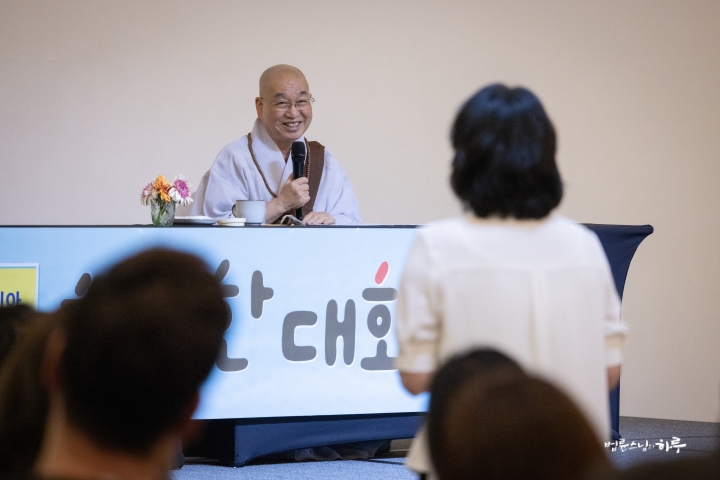
○ It’s time for me to retire and I’m economically prepared for life after retirement, but I’m still afraid of retiring. How should I deal with my attachment to the company?
○ My mother always took care of me less among family members. How can I manage my feelings of disappointment and anger?
○ A week after being diagnosed with a rare blood cancer, my husband asked for a divorce. What mindset should I live with?
○ Singapore is unfamiliar and the sales work I’m doing for the first time is too difficult. Meeting people is always burdensome.
○ I get angry at the unfair things I have to see. How should I manage my mind?
○ I came to Singapore because I disliked Korea. Depending on my mood, I want to go back to Korea, then want to stay in Singapore again – my mind goes back and forth. What should I do when my mind keeps changing?
○ Sunim, you’ve been consistently active for decades without being shaken by external conditions. How can one live consistently?
○ As South Korea went through various presidents, I too have lived my life through countless changes. How should I live the time I have left?
After taking impromptu questions from the audience, it was well past 9 PM. Though it was regrettable, the lecture concluded with promises for the next one.
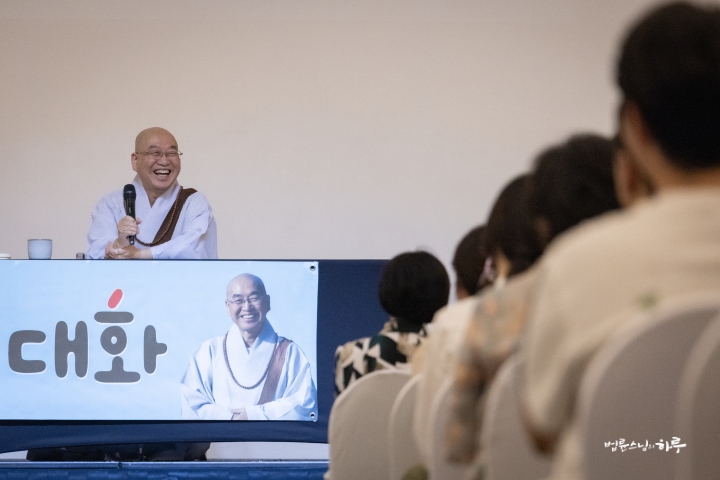
After the lecture ended, Sunim immediately came down from the stage for a book signing session. Many people lined up in a long queue to receive Sunim’s autograph.
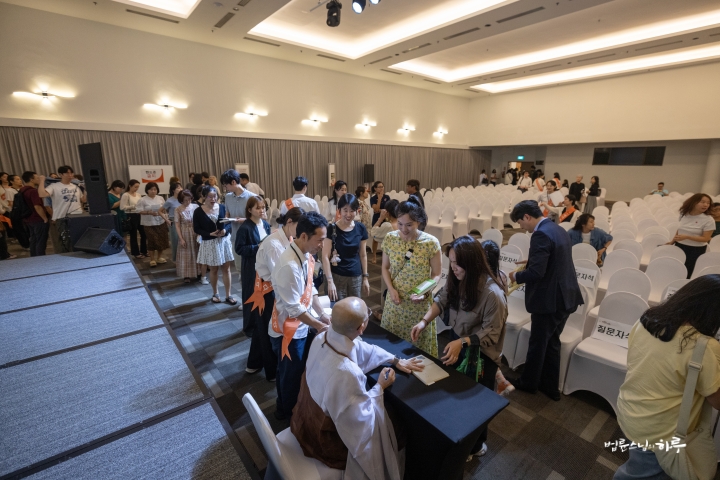
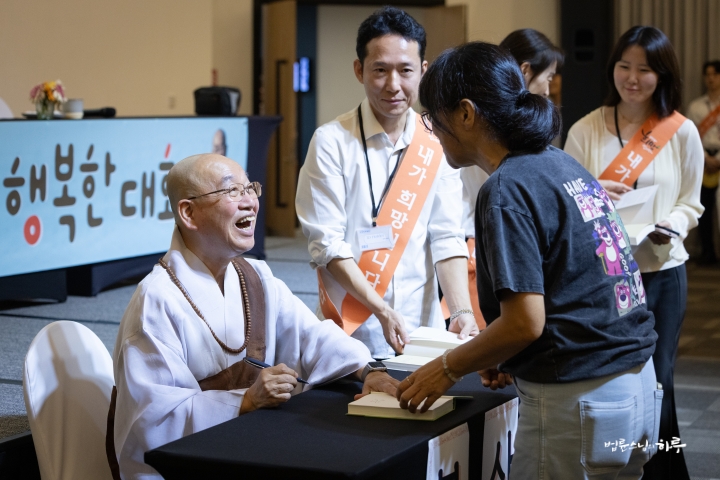
Participants each expressed their gratitude to Sunim. After the book signing ended, Sunim took a commemorative photo with the volunteers who had prepared the lecture.
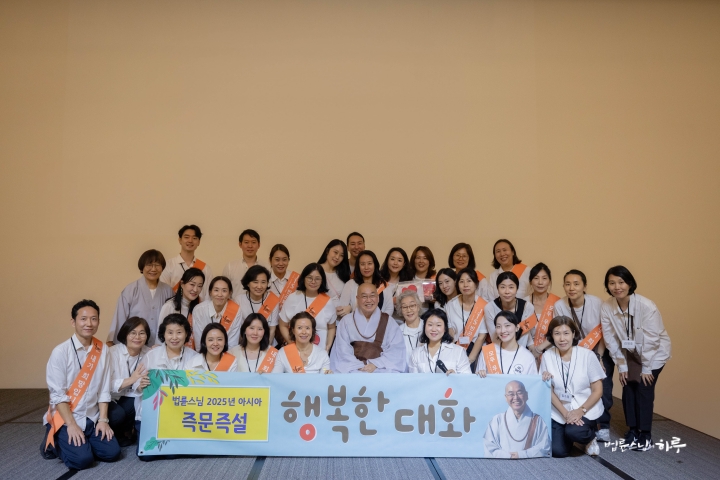
“Singapore, fighting!”
Sunim expressed his gratitude to the volunteers and then left the lecture hall.
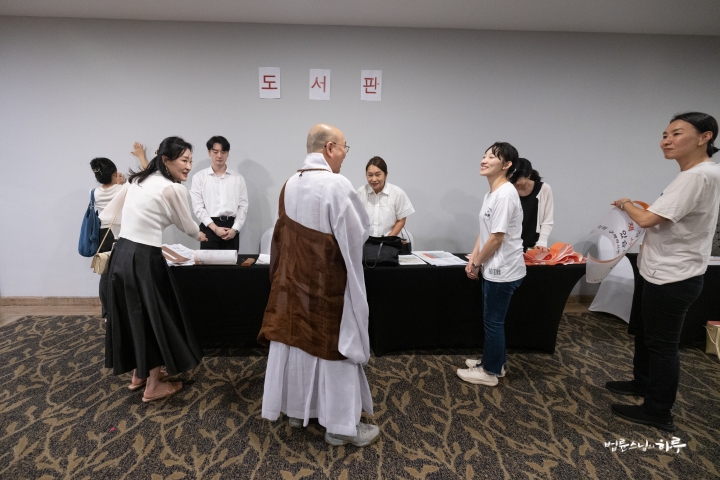
The volunteers had a sharing session with Dharma Teacher Myodeok. Everyone shared their joy, saying it was a time to experience what the ‘Mosaic Buddha’ that Sunim mentioned in his Dharma talk really meant.
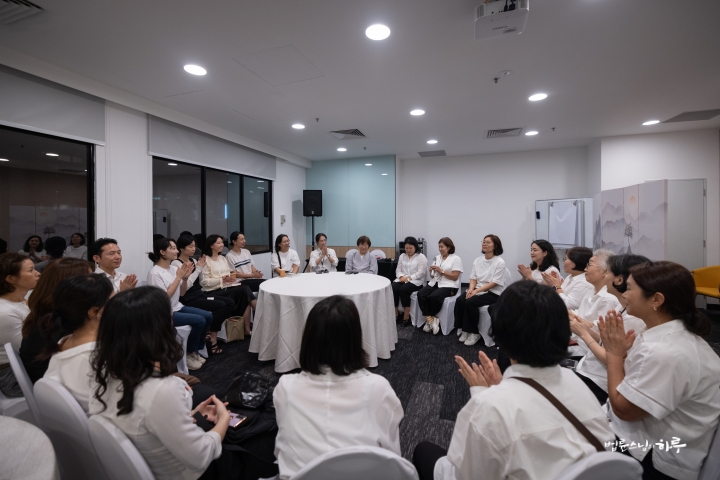
“Last year, I came as a participant, and I was so grateful to see all the volunteers. That’s why I participated as a volunteer this year. After volunteering, I feel proud. I’m even happier because when I made eye contact with each person after the lecture, many people donated generously.”
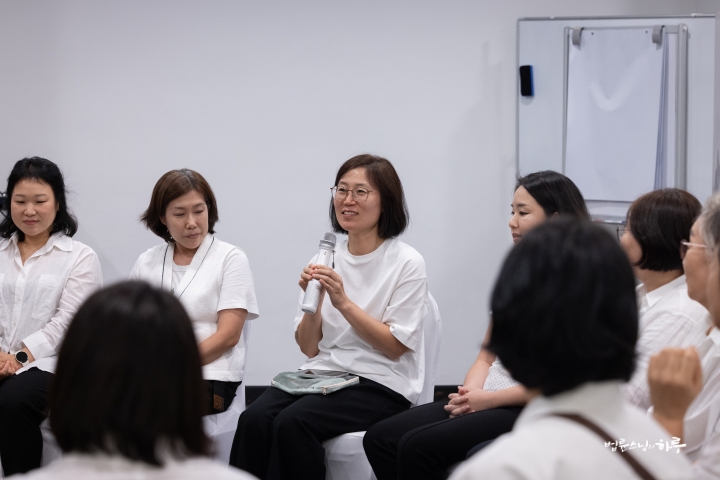
“Watching volunteers accurately carry out their assigned roles everywhere, I felt ‘This is what the Mosaic Buddha is.'”
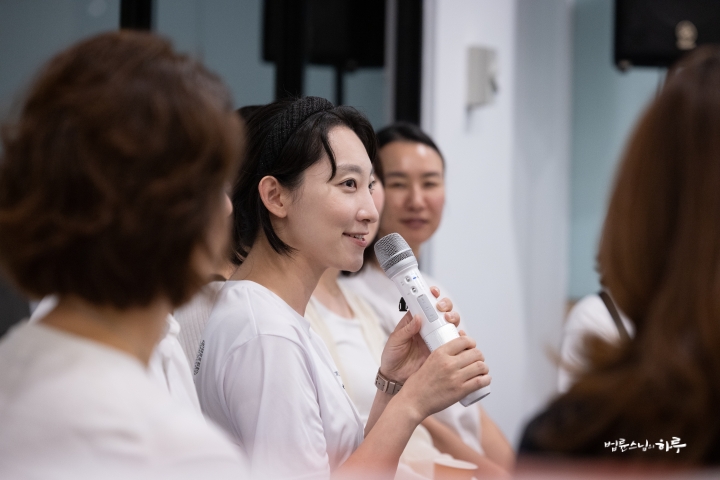
“In today’s lecture, Sunim said that the mind is always changing, so it’s not something to rely on. While preparing for the lecture, I experienced dozens of different emotions arising. That’s when I realized that volunteering becomes practice.”
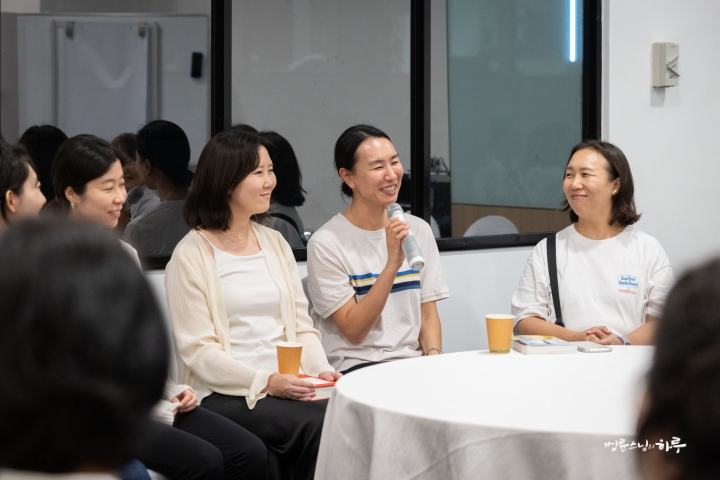
“Before the lecture, I worried a lot about how many people would come. When the lecture started and I saw the venue was completely full, I breathed a sigh of relief. The fact that I didn’t accomplish this alone but together with so many volunteers brought me even greater joy.”
They concluded the sharing session with loud applause, encouraging each other for their hard work. After returning to the accommodation, today’s schedule ended after 11 PM.
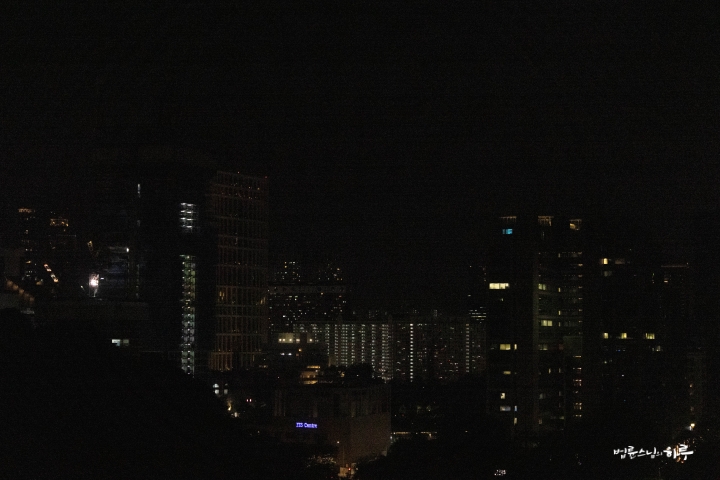
Tomorrow, Sunim will depart from Singapore early in the morning and travel to Vietnam. In the evening, he will continue with the second lecture of the Asia tour in Ho Chi Minh City, Vietnam.





